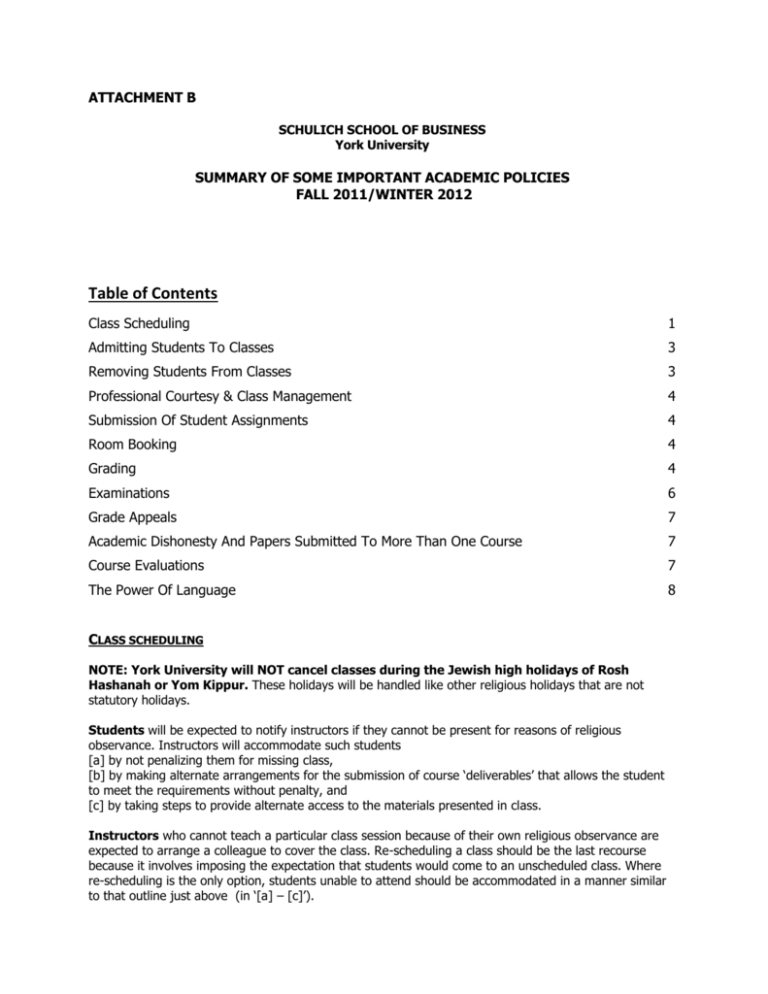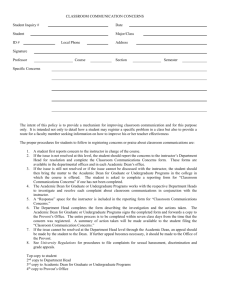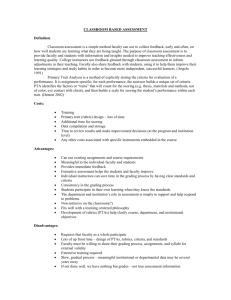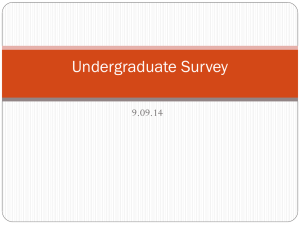Academic Policies - Schulich School of Business
advertisement

ATTACHMENT B SCHULICH SCHOOL OF BUSINESS York University SUMMARY OF SOME IMPORTANT ACADEMIC POLICIES FALL 2011/WINTER 2012 Table of Contents Class Scheduling 1 Admitting Students To Classes 3 Removing Students From Classes 3 Professional Courtesy & Class Management 4 Submission Of Student Assignments 4 Room Booking 4 Grading 4 Examinations 6 Grade Appeals 7 Academic Dishonesty And Papers Submitted To More Than One Course 7 Course Evaluations 7 The Power Of Language 8 CLASS SCHEDULING NOTE: York University will NOT cancel classes during the Jewish high holidays of Rosh Hashanah or Yom Kippur. These holidays will be handled like other religious holidays that are not statutory holidays. Students will be expected to notify instructors if they cannot be present for reasons of religious observance. Instructors will accommodate such students [a] by not penalizing them for missing class, [b] by making alternate arrangements for the submission of course ‘deliverables’ that allows the student to meet the requirements without penalty, and [c] by taking steps to provide alternate access to the materials presented in class. Instructors who cannot teach a particular class session because of their own religious observance are expected to arrange a colleague to cover the class. Re-scheduling a class should be the last recourse because it involves imposing the expectation that students would come to an unscheduled class. Where re-scheduling is the only option, students unable to attend should be accommodated in a manner similar to that outline just above (in ‘[a] – [c]’). Graduate Level Courses 1. Duration. The academic term is 12 weeks of instruction, plus a one-week final examination period for all courses with a “xxxx.03” extension and 6 weeks plus an examination period for all courses with a “xxxx.015” extension. It is Faculty policy that all courses should meet for a minimum of 12 weeks, which represents 12 full sessions for 3-hour classes or 24 full sessions for 80-minute classes. For 6-week classes 18 hours of instruction must be maintained. All classes are expected to meet for their full length. In 3-hour classes, a break must be taken in the middle to permit students to move about and recharge themselves. It is NOT acceptable to run a class for 2 or 2.5 hours without a break in order to "get out early." (This also applies to 3-hour BBA/iBBA courses). Evening classes meet from 7:00 p.m. to 10:00 p.m. with a 20-minute break. 2. MBA Reading Week: Mini-course exams: Fall: Winter: Fall: Winter: Tuesday, October 25 – Friday, October 28, 2011 Monday, February 20 – Friday, February 24, 2012 Tuesday, October 25 – Friday, October 28, 2011 Tuesday, February 21 – Friday, February 24, 2012 3. Ph.D. courses follow the York-wide sessional dates. This Fall Semester the Co-Curricular Week will be October 10 – 14, 2011 for all York Ph.D. students. The Winter Term Co-Curricular Week is February 20-24, 2012, again for all York Ph.D. students. 4. Scheduling Master’s level makeup classes is problematic, except for the mandatory makeup classes already set. (It is even more difficult to do so for undergraduate courses … see point 5, below.) We teach Monday-Friday, both day and evening, and we have introduced a weekend part-time option for MBA. That means that it is difficult to find an alternate time for your class to meet that avoids schedule conflicts for some students. What does this mean? Avoid the need for makeup classes, if at all possible. If you must be absent, you should arrange for a colleague to teach the class for you. If you schedule a makeup class, thorough consultation with the students and taking their availability into account is very important. All makeup classes MUST be scheduled with your secretary through the office of the Associate Dean – Academic, (Susan Harrison) to secure a classroom. Do NOT impose academic penalties for students who do not attend an added makeup class. No tests, quizzes, or other mandatory in-class graded activities may be scheduled for the makeup day. If graded work is due at that class, make alternative delivery arrangements that do not penalize students who are absent. Make arrangements for students to have alternate access to the in-class materials … tape your class, provide notes, post on course material data base, PowerPoint slides, and/or find other ways of providing access to the materials covered. Undergraduate Level Courses 1. 2. Sessional dates for the BBA/iBBA program differ from those for the Master’s Programs. The BBA and iBBA program operates on the uniform York undergraduate class timetable. Each term has a CoCurricular (previously “Reading Week”) in which regularly scheduled courses are not held. This Fall Semester the Co-Curricular Week will be (Monday, October 10 – 14, 2011) for all York Undergraduate students. The Winter Term Co-Curricular Week is February 20-24, 2012, again for all York undergraduate students. All students in all years of the BBA/iBBA programs are taking courses in both SSB and other Faculties (principally in the Faculty of Arts). As a result, there are no "clear" days or times during which makeup classes can be scheduled. If you lose a class because of illness or other unavoidable circumstance, it will 2 be necessary to schedule a makeup class, thorough consultation with the students and taking their availability into account is very important. All makeup classes MUST be scheduled with your secretary through the office of the Associate Dean – Academic, (Susan Harrison) to secure a classroom. No tests, quizzes, or other mandatory in-class graded activities may be scheduled for the makeup day or if graded work is due at that class, make alternative delivery arrangements that do not penalize students who are absent. Make arrangements for students to have alternate access to the in-class materials, i.e., tape your class, provide notes, post on course material data base, PowerPoint slides, and/or find other ways of providing access to the materials covered. NOTE: Doctoral courses follow the university-wide teaching dates (same as undergraduate courses). ADMITTING STUDENTS TO CLASSES The upper limit on electives is normally 45 for electives and 55 for core courses in the undergraduate and Master’s level programs we offer. When courses are full, students are placed on a waiting list. a. For master’s level students: If a section fills and additional students wish to enrol in the course, the Division of Student Services creates and manages a wait list. This list is the mechanism by which students are admitted to the course if spaces become available. Students may enrol in a course until the end of the first week of class without special permission. (If, and only if, you wish to have students be able to add the course you are teaching until the end of the second week of classes, you should inform Student Services in writing [email will do]. Student Services will then continue to work with the wait listed students during the second week.) There is no need for instructors to give permission to individual students (sign them in). An instructor that does sign in a student will have effectively agreed to increase her class size by the number of students signed in. We take these steps to make the wait list the single mechanism for gaining enrolled status in a section that has filled. Instructors may, at their discretion, increase the class limit; the Division of Student Services will then enrol students in order from the wait list until the new maximum is reached (or subject to space availability in the room). b. For undergraduate students: By university policy, all undergraduate students may enrol in courses up through the end of the 2nd week of class (this Fall semester, September 16, 2011 is the final date), without the instructor’s permission. Student Services maintains wait lists for filled undergraduate classes and manages openings the same way as they do for Master’s level courses. There is no need to sign students into your undergraduate courses, unless you are willing to increase the class size by the number of students you ‘sign in’. Please note that a student must formally enrol either using on-line university procedures or through staffassisted enrolment procedures to be formally enrolled in a course. Your permission by itself or a student’s simply having attended without proper enrolment will not provide the student standing as being enrolled in your course. REMOVING STUDENTS FROM CLASSES Any students that do not attend the first or second class and have not made prior arrangements with you, may be reported to Student Services to be de-registered. This is to make room for students on the waiting list. Please make such a request during the week(s) where enrolment is permitted without permission from the instructor (up to September 20, 2011 for Master’s level students and September 16, 2011 for undergraduates) only if your course is full and you want to make room for wait-listed students. In special circumstances, students may be removed from classes due to disorderly conduct. Consult the York University Senate Academic Policies and Regulations section of either the Graduate Academic 3 Handbook or the Undergraduate Academic Handbook, or contact the Associate Dean – Academic’s office for more information. To drop a class, students must formally change their enrolment. Withdrawal cannot be done simply by telling the instructor that they wish to withdraw. PROFESSIONAL COURTESY & CLASS MANAGEMENT Please remember that many classes are held in the classrooms you use. Leaving the room in orderly condition is appropriate and appreciated. All instructors are expected to observe normal courtesy to their colleagues and students. Most of the following is well-understood by faculty, but a few matters seem to arise from time to time, so here a few reminders: Please avoid unflattering comments or ‘humorous observations’ with reference to other instructors or courses. While humour can be very effective in teaching, it should be combined with judgement and sensitivity. It is also important that you be on time for class; (obviously) that you be well prepared; and that students are treated with courtesy and respect. Please be careful to observe the ending time for your classes; more often than not, another instructor has to get into your room to set up for her or his class in the following time slot. In particular, “1½ hour” classes that begin at 8:30, 1:00 and 2:30 should be dismissed after 70 minutes (i.e., at 9:50, 2:20 and 3:50, respectively) to allow students in your course to change classes and a prompt beginning for the following class being taught in your room. Please thoroughly clean off the chalkboard at the end of class (except for night classes, after which the boards are washed). Please return classroom furniture to its normal configuration, if it has moved during your class. It is appropriate to ask your students to help keep the classrooms orderly by picking up refuse as they leave for the next class. It is particularly important that you properly log off and shut down the computer/projector equipment at the end of your class session. SUBMISSION OF STUDENT ASSIGNMENTS The School’s policy is that no faxed assignments will be accepted, due to resource constraints on both equipment and personnel. If students cannot deliver an assignment in person or via email by the due date, you should accept all assignments that are postmarked by the due date. Note that it is not reasonable to expect students to send assignments by courier, due to the costs involved. Please take care in the collection and “custody” of the student assignments and tests. Students’ written work and your evaluation of that work should not be accessible to other students. ROOM BOOKING Classrooms for makeup classes, one-time use, and examinations must be booked by your secretary through the Assistant to the Associate Dean, Academic (Susan Harrison). Rooms for final examinations are automatically booked through the Associate Dean's office, and the schedule of final examination room assignments will be made available towards the end of each term. GRADING 1. Your course outline must clearly indicate the basis upon which the final course grade will be determined, and you must stick to that grading scheme. Imprecision in specifying the grading scheme or deviation 4 from that scheme will invite time-consuming (and potentially successful) grade appeals. You can indicate that class participation/contribution will be part of the grade, but the size of that component must be stated at the outset. For more detailed information see the grading guidelines described in points 16 through 20. 2. If class participation is a component of your grading, you must be systematic and contemporaneous in assigning participation marks for each session. (Senate Legislation requires – and it is simply a good idea – that contemporaneous [class-by-class] records be kept if participation is to be used as a graded element of the course). It is essential that you be fair in your grading, and also that you be seen to be fair. Participation marks should be assigned immediately after each class session, and should be based on quality of participation, not just on quantity. 3. This Faculty does not use a standardized percentage grading scale; a cumulative mark of (say) 70% in a course has no automatic letter grade equivalent. However, parts of York and many other Canadian universities often do use standard systems in which (for example) anything above 50% is a pass, and many of your students most likely will be accustomed to such systems. Therefore, if you use numerical marks on your examinations or assignments, be sure to make it clear to the students what those marks mean in letter grades (e.g., if you consider 60% to be a minimum pass, then say so.) 4. A particularly challenging aspect of assigning grades in SSB is that there are two different grading scales in use in the BBA/iBBA and Graduate (i.e., Master’s) programs, due to circumstances beyond our control. Both systems produce 9-point grade index values, but the corresponding letter grades are different and the GPAs that must be maintained by graduate and undergraduate students are different. Therefore, you must be very careful to use the correct scale. Grading and promotion policies for the programs are given in the Academic Requirements section of the Undergraduate Academic Handbook and the Graduate Academic Handbook. It is important that you thoroughly familiarise yourself with these policies. BBA/iBBA Grading The BBA/iBBA grading scheme is the common undergraduate grading system mandated by the University: Letter Grade: A+ A B+ B C+ C D+ D [E*] F Index Value: 9 8 7 6 5 4 3 2 0 Undergraduate students must maintain a 5.0 average (C+) to remain in good standing. The percentage equivalents of letter grades are legislated for most Undergraduate programs at York, and our students will encounter them in non-Schulich courses. However, Schulich does not require the equating of particular percentages to a particular letter grade. Instructors have the discretion to map percentages to letters as they deem appropriate. For clarity, you should be sure that your students know how you are going to convert numerical or percentage grades into a letter grade for your course. It is useful to cover this in both your written materials (course syllabus) and to discuss it in class. The following are the grading guidelines that apply to sections of the BBA courses. 1. The average course grade awarded within a section of a BBA or iBBA course should be between 5.5 and 7.0. 5 2. The expectations and grading protocols for different sections of the same course offered in a particular term should be coordinated to minimize variations among sections. 3. Grade distributions that do not meet the guidelines need to be reviewed by the Area Coordinator. The Course Director and the Area Coordinator should be prepared to explain the basis for the grade distributions that do not meet the guidelines. (There can be legitimate reasons for such distributions. The attempt of the guidelines is to reduce the incidence of random or arbitrary exceptions.) Graduate Level Grading The Master's level grading system is [also] a 9 point system: Letter Grade: Index Value: A+ 9 A 8 A7 B+ 6 B 5 B4 C+ 3 C 2 C1 F 0 There are no "D" grades. Students must maintain a GPA of 4.2 throughout the program and have at least a 4.4 to graduate. The Dean's List requirement is 7.0 or better. Faculty Council mandates the following guidelines on average grades in Graduate level courses: 1. Core Courses: between 4.7 and 6.1, unless approval for an exception has been received from the Grade Distribution Committee. 2. Electives: between 5.2 and 6.2 unless approval for an exception has been received. The Grade Distribution Committee consists of the MBA Program Director, the Associate Dean Academic, and the Chair of the Student Affairs Committee. EXAMINATIONS Mid-term examinations are to be held during regular class periods. Final examinations must be held during their officially scheduled time slots in Finals Week. They may not be rescheduled at the instructor's option to more convenient times. NO examinations of any kind, in class or take-home, may be held (or may be made due) during the last two weeks of classes in a semester! All examinations (quizzes, tests, and finals) are to be newly set exams; old examinations should not be recycled as they are available to students. Special examinations A student may approach you to request a special sitting of an examination. Delayed examinations are usually requested due to illness or for other personal reasons, such as required business travel. You may grant such requests if you feel the circumstances are meritorious, but you are not required to do so unless you are otherwise instructed by the Executive Director of Schulich Student Services and International Relations or by the Associate Dean – Academic. When special sittings of examinations are arranged, the examination should be different from that given to the rest of the class, unless the two sittings overlap. 6 Faculty policy does not permit supplemental examinations, i.e., a second examination that is given to replace poor results on a student's first examination. Students must live with their examination results – no ‘do-overs’! Some students are given accommodation for various personal circumstances when it comes to examinations. The Student Services department is the school’s connection to the university’s centre for persons with disabilities, and you are encouraged to work with Student Services to determine whether a student has been assessed as requiring accommodation, and the nature of that accommodation. GRADE APPEALS If a student is dissatisfied with his or her grade, he or she may appeal the grade to the Associate Dean – Academic. Prior to filing a formal appeal, however, the student is instructed to contact the instructor and to review the basis on which the grade was awarded. It is customary for a student to be permitted to see his or her final examination, even though you may not have put any comments on it. While this may seem to be a nuisance, it will often result in no formal grade appeal being submitted. Therefore, a little time spent with a student who is dissatisfied will normally result in a substantial saving of the time and energy required by a formal appeal. If you have any questions about grade appeal procedures, please contact the office of the Associate Dean – Academic. ACADEMIC DISHONESTY AND PAPERS SUBMITTED TO MORE THAN ONE COURSE It is necessary to be vigilant when giving examinations. Past experience has shown that it is far better to provide proper invigilation than to cope either with allegations of academic dishonesty or with student unrest that can easily develop if there is the perception that examination procedures are lax. It is considered a breach of academic honesty for a student to submit the same paper in two or more courses without the explicit, prior permission of the instructors of the courses. The SSB policy on papers to satisfy more than one course requirement is on page 83 of the Graduate Academic Handbook, and page 19 in the Undergraduate Academic Handbook. Suspicions of academic dishonesty (such as plagiarism, cheating, or multiple paper submissions) should be handled in accordance with the academic honesty procedures. The full policy is printed in the Academic Handbooks and available on the Schulich website. Please contact Olga Carew, Schulich Petitions and Appeals Officer, (ext. 22744, Student Services), for further help. Any materials suspected of being compromised (assignments, examination booklets, etc.) must be retained by the instructor until the matter is resolved. Any broader or atypical concern about academic honesty should be brought to the attention of the Associate Dean – Academic for guidance and direction. COURSE EVALUATIONS Some time during the last two weeks of class every course must be evaluated by the students. Student Services will send you a package of evaluations for each course, with the procedures attached to the package. It is important that you follow the established procedures. In particular, you should allow enough time and leave the classroom when the evaluations are being filled out. 7 After the end of the term, and after all grades have been submitted, the evaluations are tabulated and the results are distributed to you, to your area co-ordinator, to the Associate Dean Academic, to the Dean, and to the UBC, GBC and Library for consultation by the students. The Dean's copy becomes part of your permanent file and will be taken into consideration for tenure and promotion decisions (for tenure-stream faculty) or reappointment (for part-time and contractually-limited appointments). THE POWER OF LANGUAGE As educators, we are all aware of the power of words to convey complex and subtle concepts and attitudes. In class, we use language to communicate ideas, but we also need to be aware of the potential for communicating negative or stereotypical attitudes, intentionally and unintentionally. This is as true of subtle race and gender distinctions as it is of explicit prejudice. Please be careful that in the speech that occurs in your classes and in your written material that you (as well as your students) use language which is free of gender, racial, sexual or other bias. Updated August 2011 by the ADA’s office 8








